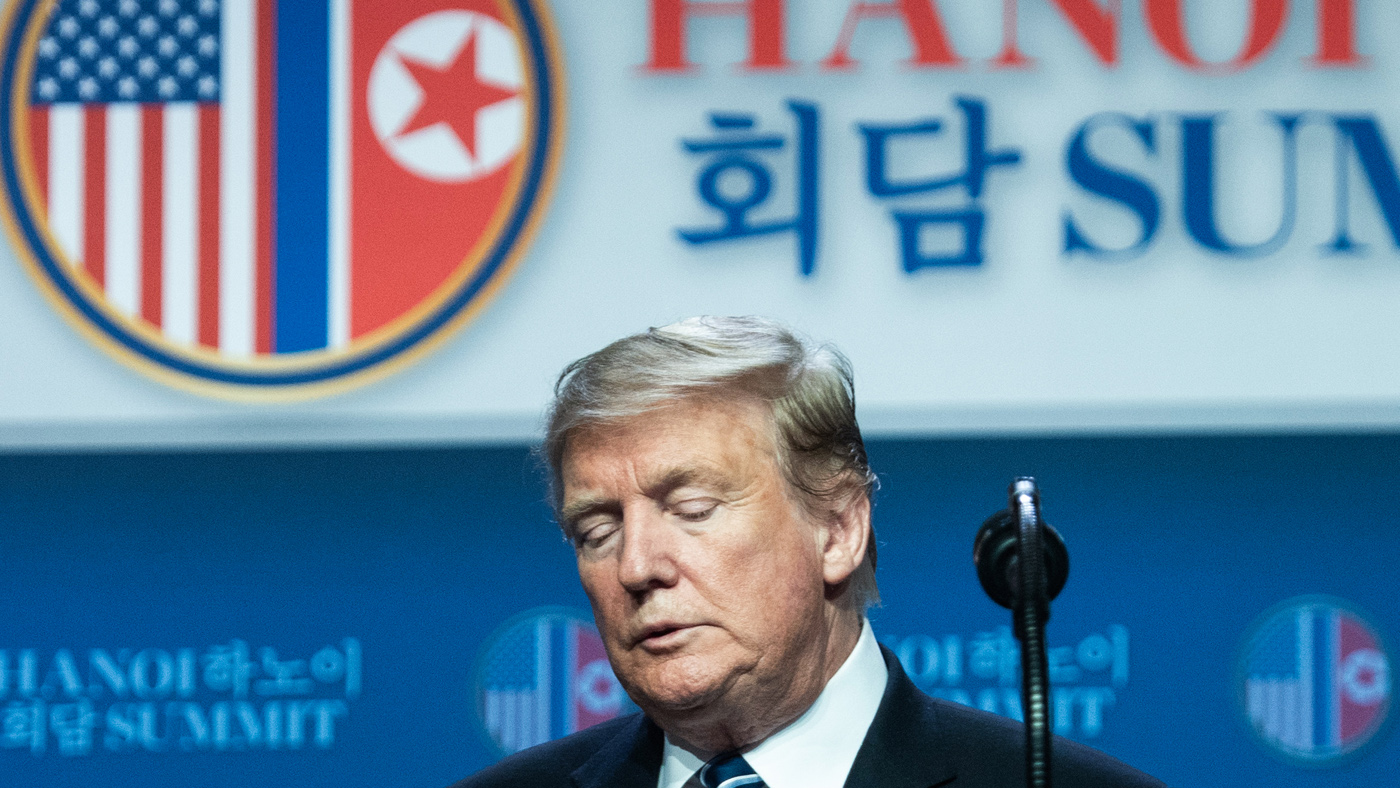Why Trump/Kim summit was cut short with no deal
US President says talks failed over Kim’s demands to lift sanctions ‘in their entirety’

A free daily email with the biggest news stories of the day – and the best features from TheWeek.com
You are now subscribed
Your newsletter sign-up was successful
US President Donald Trump has told reporters that he “had to walk away” from a historic Vietnam summit with North Korean leader Kim Jong Un without reaching an agreement on nuclear disarmament.
Confusion reigned in Hanoi yesterday, after the scheduled end of the talks between the two leaders was moved forward by two hours and a planned joint signing ceremony was cancelled.
Optimism had been boosted prior to their meeting when Kim said he would not be at the summit if he were not prepared to denuclearise.
The Week
Escape your echo chamber. Get the facts behind the news, plus analysis from multiple perspectives.

Sign up for The Week's Free Newsletters
From our morning news briefing to a weekly Good News Newsletter, get the best of The Week delivered directly to your inbox.
From our morning news briefing to a weekly Good News Newsletter, get the best of The Week delivered directly to your inbox.
But Trump told media today that Pyongyang had pushed for all sanctions against the country to be lifted in return for closing down its nuclear facilities.
“They wanted the sanctions lifted in their entirety, but we couldn’t do that,” the president said, adding: “Sometimes you have to walk.”
“They were willing to denuke a large portion of the areas that we wanted, but we couldn’t give up all of the sanctions for that. We had to walk away from that.”
However, Trump dismissed any notion of increasing sanctions against Pyongyang, pointing to the impact that such a move would have on North Korean citizens.
A free daily email with the biggest news stories of the day – and the best features from TheWeek.com
"There are people in North Korea that have to live also... I would say my whole attitude changed a lot because I got to know Chairman Kim very well," he said.
He also stressed that his relationship with Kim remained “very strong” and hinted that talks could resume at a later date.
“I want to keep the relationship - we'll see what happens over the next period of time,” the president said.
Meanwhile, the North Korean dictator “remained more vague on whether he would be able to strike a deal with Trump”, reports Euronews.
"It's too early to tell, but I wouldn't say I'm pessimistic. For what I feel right now, I do have a feeling that good results will come out," Kim said, in what is believed to be his first ever response to a question from a foreign journalist.
Despite the pleasantries between the two leaders, the curtailed summit is viewed as a significant failure by regional experts.
Leonid Petrov, an academic at Canberra’s Australian National University, said the breakdown of talks exposed the “yawning chasm” between the goals of the two nations.
Chad O'Carroll, of the Korea Risk Group consultancy firm, said the collapse is a "very bad outcome" for Trump. The impasse with Washington DC “could result in Kim Jong Un forging even closer ties with China” and also stymies inter-Korean peace efforts, O'Carroll added.
The South Korean government, which is keenly invested in the process, has said the failure to reach a deal is "disappointing", the BBC reports.
The broadcaster’s Seoul correspondent Laura Bicker says that the “lack of progress or plan to get Kim Jong Un to give up his weapons will allow critics to ask what is the point”.
-
 5 cinematic cartoons about Bezos betting big on 'Melania'
5 cinematic cartoons about Bezos betting big on 'Melania'Cartoons Artists take on a girlboss, a fetching newspaper, and more
-
 The fall of the generals: China’s military purge
The fall of the generals: China’s military purgeIn the Spotlight Xi Jinping’s extraordinary removal of senior general proves that no-one is safe from anti-corruption drive that has investigated millions
-
 Why the Gorton and Denton by-election is a ‘Frankenstein’s monster’
Why the Gorton and Denton by-election is a ‘Frankenstein’s monster’Talking Point Reform and the Greens have the Labour seat in their sights, but the constituency’s complex demographics make messaging tricky
-
 Trump links funding to name on Penn Station
Trump links funding to name on Penn StationSpeed Read Trump “can restart the funding with a snap of his fingers,” a Schumer insider said
-
 Trump reclassifies 50,000 federal jobs to ease firings
Trump reclassifies 50,000 federal jobs to ease firingsSpeed Read The rule strips longstanding job protections from federal workers
-
 Is the Gaza peace plan destined to fail?
Is the Gaza peace plan destined to fail?Today’s Big Question Since the ceasefire agreement in October, the situation in Gaza is still ‘precarious’, with the path to peace facing ‘many obstacles’
-
 Vietnam’s ‘balancing act’ with the US, China and Europe
Vietnam’s ‘balancing act’ with the US, China and EuropeIn the Spotlight Despite decades of ‘steadily improving relations’, Hanoi is still ‘deeply suspicious’ of the US as it tries to ‘diversify’ its options
-
 Trump demands $1B from Harvard, deepening feud
Trump demands $1B from Harvard, deepening feudSpeed Read Trump has continually gone after the university during his second term
-
 Trump’s Kennedy Center closure plan draws ire
Trump’s Kennedy Center closure plan draws ireSpeed Read Trump said he will close the center for two years for ‘renovations’
-
 Trump's ‘weaponization czar’ demoted at DOJ
Trump's ‘weaponization czar’ demoted at DOJSpeed Read Ed Martin lost his title as assistant attorney general
-
 Gabbard faces questions on vote raid, secret complaint
Gabbard faces questions on vote raid, secret complaintSpeed Read This comes as Trump has pushed Republicans to ‘take over’ voting